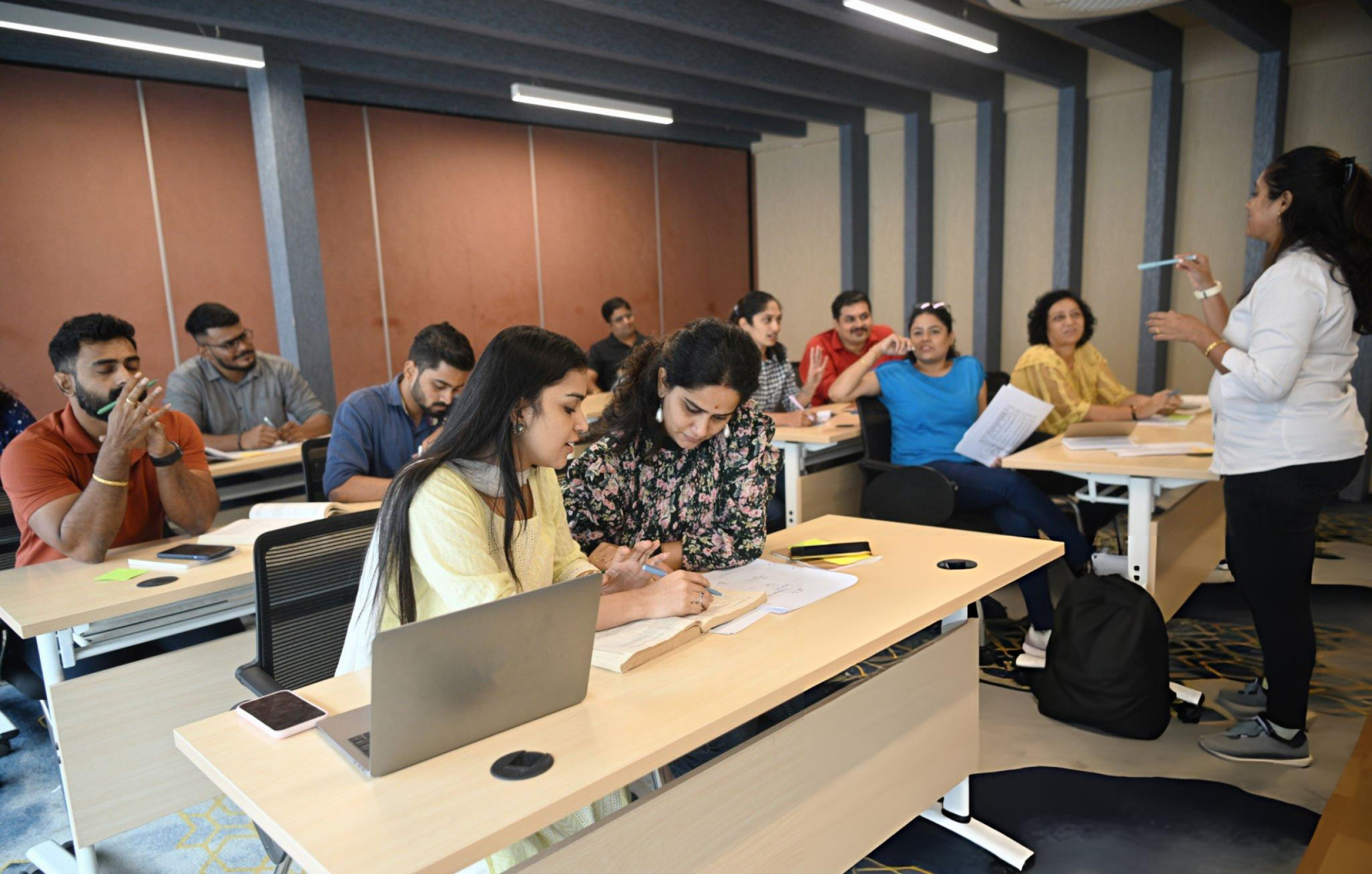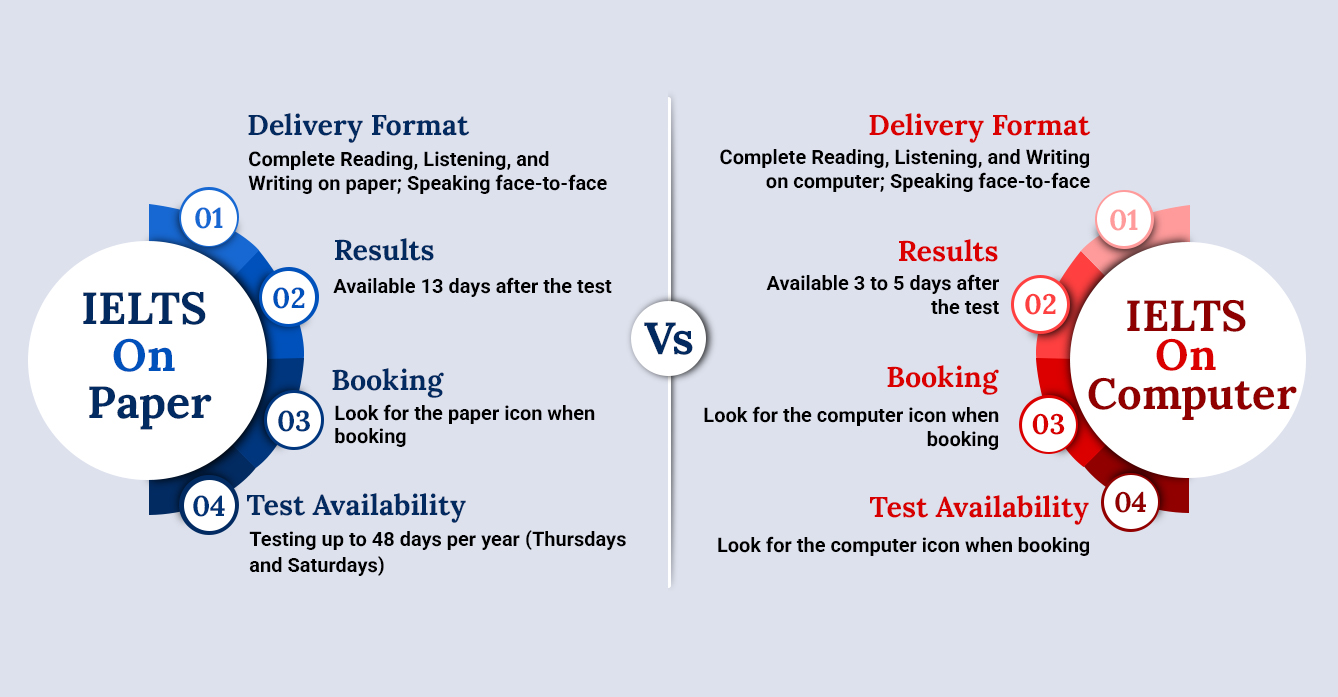IELTS
IELTS Coaching Institute in Panchkula
Gratis School of Learning offers one of the best IELTS Coaching in Panchkula, where students learn all the four skills, that is, Listening, Reading, Writing, and Speaking. We have different student data from Panchkula, Zirakpur, Chandigarh, & Mohali, permitting us to offer the flexibility of class timings, the latest study material, and an experience of getting students their scores.
So, why hesitate? So join us today for unparalleled IELTS coaching in Panchkula and take your first step towards fulfilling your educational or immigration dream.
Why Choose Our IELTS Coaching in Panchkula?
The best IELTS Coaching Center in Panchkula, where you get personalized attention and an oriented approach by the experts. Extensive experience in training individuals through the hard task of IELTS test, and all are certified trainers. Our tailored, 1-on-1 coaching is designed to help students fight specific obstacles they encounter while speaking, writing, reading, and listening. We even provide Spoken English classes in Panchkula, helping students build fluency for both academic and day-to-day communication.
Here’s why Gratis School of Learning stands out as the best IELTS institute to become your trusted ally in conquering the IELTS:
Personalized learning
Everyone learns differently, so we tailor our coaching to your strengths and weaknesses. Our instructors give individual feedback and focused support where you need it most.
Targeted skill development
We don’t just teach general English; we focus on the specific skills needed for IELTS. Through interactive lessons and exercises, you will improve your grammar, vocabulary, critical thinking, and analytical skills. This will help you handle any IELTS question confidently.
Focused practice
Knowledge is important, but practicing under real exam conditions is crucial. We offer many practice materials, including mock tests that simulate the actual exam. These help you identify areas for improvement, build confidence, and manage exam pressure.
Supportive community
Beyond just coaching institute, Gratis Learning fosters a community among its students. You’ll have opportunities to connect with others facing similar challenges, exchange study tips, and support each other throughout your IELTS preparation journey.
Flexible schedules and classes
Our IELTS coaching center in Panchkula offers adaptable class schedules, catering to students, professionals, and homemakers. We provide morning, evening, and weekend sessions to ensure that learning aligns conveniently with your availability.
Positive learning environment
Studying for the IELTS can be challenging, but at Gratis Learning, you’ll study in a positive and encouraging environment. You’ll be surrounded by peers who are also preparing for the exam, creating a supportive community where you can share experiences, ask questions, and motivate each other.
Custom feedback and progress tracking
We believe in continuous improvement and we give you detailed performance tracking for this. Mock tests and feedback strengthen the students to discover their strengths and weaknesses, based on which they can formulate a study plan for improvement.
Thorough Course Outline
We provide an IELTS Coaching in Panchkula, dividing IELTS into four parts, i.e. Listening, Reading, Writing, and Speaking, and preparing you wholeheartedly. We have planned the upcoming, our Free Training Course from scratch & for Takes into consideration both beginners & experienced users with case studies and labs.
Current resources and practice tests
Improve your confidence with up-to-date and comprehensive content, practice questions, and mock tests. We provide the most up-to-date IELTS format details here and IELTS Sample Paper, listening and speaking module resources that are very helpful in achieving higher scores on IELTS academic test.
Serving Aspirants from Zirakpur, Chandigarh, and Mohali
Our IELTS training in Panchkula is a favored option for Zirakpur, Chandigarh, and Mohali students because of our outstanding success rate and convenient location. Numerous students from these areas choose our ielts institute to take advantage of our exceptional training facilities and skilled instructors. Our center is well-connected by public transportation, making it easy for students commuting from surrounding cities.

Purpose of the IELTS Exam
IELTS scores are crucial for achieving academic, professional, and migration goals. They validate your English proficiency across these main purposes:
- Study Abroad: Want to go to college in an English-speaking country? Many universities will accept your IELTS score to show you have the English skills you need to succeed in their classes.
- Work Abroad: Thinking about getting a job in an English-speaking country? Some professions, like doctors, nurses, and teachers, may require an IELTS score to prove your English is good enough for the job.
- Move Abroad: If you dream of living in an English-speaking country like Australia, Canada, New Zealand, the UK, or the USA, many governments ask for an IELTS score when applying for permanent residency. The IELTS General Training test is the specific exam you will need for this purpose.
Types of IELTS Tests
- IELTS Academic: This test is for those who want to go to college or university where English is the main language of instruction. It checks your English skills to make sure you can understand lectures and coursework.
- IELTS General Training: This test is for people who want to work, migrate, or study in a basic English-speaking environment. It focuses on everyday English you would use at work or while socializing.
- IELTS for UKVI: This test is tailored for UK visa applications and fulfills the language requirements established by UK Visas and Immigration.
- IELTS for Life Skills: This is a special test for people applying for UK visas. It only tests your speaking and listening skills in everyday situations, offered at two levels (A1 and B1).
Eligibility Criteria
Anyone aged 16 or above can take the IELTS exam, regardless of nationality or background.
Modes of Delivery
- Pen and Paper-based: Traditional format for Listening, Reading, and Writing, with Speaking conducted face-to-face.
- IELTS on Computer: Complete Listening, Reading, and Writing on a computer, with Speaking still face-to-face. Benefits include faster results and flexible test dates.
Paper-based vs Computer-based IELTS

How does IELTS work?
The IELTS test evaluates your English proficiency in four skills:
Listening
Understand spoken language in various contexts.
Reading
Comprehend written texts, from academic articles to everyday notices.
Writing
Express ideas coherently and use correct grammar and vocabulary.
Speaking
Converse effectively on familiar topics with an examiner.
IELTS Listening Test
You will listen to four recordings by native English speakers and answer related questions. The test lasts 30 minutes.
IELTS Reading Test
The IELTS Reading test consists of 40 questions designed to evaluate various reading skills. You will need to read for the gist, main ideas, details, logical arguments, skimming, and understanding the writer’s attitudes, opinions, and intentions. The test lasts 60 minutes.
IELTS Writing Test
The IELTS Writing test involves completing two tasks on topics of general interest, depending on the module you are taking. The IELTS Writing test is of 60 minutes.
IELTS Speaking Test
The IELTS Speaking test evaluates your spoken English skills. It is recorded and divided into three parts, lasting 11-14 minutes.
A breakdown of the IELTS Syllabus
Need one line to add here.. Will add line there later once get from content writer
IELTS Listening
- Duration: 30 minutes
- Number of Questions: 40 questions with various types.
- Test Format: Listen to four recordings (two monologues and two conversations) featuring different accents (British, Australian, New Zealand, North American). Each recording is played once.
- Part 1: A conversation between two people in a social context (e.g., at an accommodation agency).
- Part 2: A monologue in a social context (e.g., a speech about local facilities).
- Part 3: A conversation between up to four people in an educational/training context (e.g., a university tutor and a student discussing an assignment).
- Part 4: A monologue on an academic subject (e.g., a university lecture).
Tips
- Check if your headphones are working.
- Use the preparation time to read through the questions.
- Focus on answering the questions rather than understanding everything.
- Take notes on your question paper.
- Stick to the word limit for each question.
- Proofread for spelling and grammar errors.
- Consider using all capital letters for your answers.
IELTS Reading
- Duration: 60 minutes
- Number of Questions: 40 questions with various types.
- Test Format: Identify opinions, attitudes, and purposes of writers, using different reading techniques like skimming.
- Reading Academic: One long passage per section with tasks. Topics are of general interest to undergraduate or postgraduate students. Texts can include diagrams, graphs, or illustrations from various sources (e.g., books, journals, newspapers).
- Reading General Training: Five or six texts of varying lengths with tasks.
- Section 1: Two or three short texts on everyday topics.
- Section 2: Two short, work-related factual texts.
- Section 3: One longer text on a general interest topic from various sources (e.g., advertisements, handbooks, official documents, books, newspapers).
Tips
- Pay attention to details in figures, graphs, or images.
- If you don’t understand a question, move on and return to it later.
- Don’t write on the question paper; there’s no extra time to transfer answers.
- Focus on finding answers in the passage.
- Be precise, grammatically correct, and to the point. Proofread before submission.
- Consider using all capital letters for your answers.
- General and Academic Reading tests are graded similarly, though Academic texts can be more challenging.
IELTS Writing
- Duration: 60 minutes
- Number of Questions: No multiple-choice questions; write at least 250 words in about 40 minutes.
- Test Format: Two tasks on topics of general interest.
- IELTS Academic Task 1: Describe visual information (e.g., graph, table, chart, or diagram) in at least 150 words in about 20 minutes.
- IELTS General Training Task 1: Write a letter responding to a situation (e.g., asking for information or explaining a situation) in at least 150 words in about 20 minutes.
- IELTS Academic and General Training Task 2: Discuss a point of view, argument, or problem.
Tips
- Quickly analyze tasks and prepare answers mentally.
- Divide your time smartly: 20 minutes for Task 1, 40 minutes for Task 2.
- Write over 150 words for Task 1 and over 250 words for Task 2.
- Avoid repeating ideas, phrases, and words.
- Ensure to write a conclusion for Task 2.
- Write precise, relevant answers; avoid long paragraphs and sentences.
- Use active voice and avoid passive voice.
- Revise and proofread before submission.
IELTS Speaking
- Duration: 11 to 14 minutes
- Number of Questions: No specific questions; evaluated through an interview.
- Test Format: Assesses spoken English skills and is recorded for assessment. The format is the same for both Academic and General
- Training versions.
Part 1 (4-5 minutes): General questions about yourself and familiar topics (e.g., home, family, work, studies, interests). - Part 2 (3-4 minutes): Given a card with a topic to speak about. You have 1 minute to prepare and then speak for up to 2 minutes, followed by one or two questions from the examiner.
- Part 3 (4-5 minutes): Further questions related to the topic in Part 2, allowing you to discuss more abstract issues and ideas.
Tips
- Quickly analyze tasks and prepare answers mentally.
- Divide your time smartly: 20 minutes for Task 1, 40 minutes for Task 2.
- Write over 150 words for Task 1 and over 250 words for Task 2.
- Avoid repeating ideas, phrases, and words.
- Ensure to write a conclusion for Task 2.
- Write precise, relevant answers; avoid long paragraphs and sentences.
- Use active voice and avoid passive voice.
- Revise and proofread before submission.
IELTS Registration Process
To register for IELTS, visit the official IELTS website or contact your nearest test center. Choose your preferred test format and location, then book your test date. Ensure you have a valid ID and payment details ready when registering.
Enroll Today and Achieve Your Dream IELTS Score!
Join the best IELTS Institute in Panchkula now at Gratis School of Learning, and take the first step toward getting your dream score! Whether you’re from Panchkula, Zirakpur, Chandigarh, or Mohali, we invite you to be a part of our success journey.
Contact us today to book your free demo class & kickstart your IELTS preparation with the best trainers in the region.
Frequently Asked Questions (FAQs) about IELTS Coaching in Panchkula
The completion time depends on the student but typically takes 4 to 8 weeks. We also offer crash courses for students who need immediate preparation.
Weekend batches are suitable for working professionals and students with tight schedules.
Our fees are structure is very competitive and depends on the duration and type of course. For details and special discounts contact us or check our website.
Yes, demo classes are offered free of charge to make students familiar with our teaching methodology. This way, students can try out our quality of instruction before committing.
YES, we help students with IELTS exam registration and Test date & location selection. Our counselors assist you with full guidance to make the process a lot easier.
Yes, we provide backup classes along with recorded sessions for the students who miss any class.
Top Bands Achievers
Learn What Our Students have To Say about Us!
GOODTrustindex verifies that the original source of the review is Google. I Completed 3 months Training in IELTS. Gratis Learning is the best IELTS Training Institute in Panchkula. I must recommend you Guys!!Trustindex verifies that the original source of the review is Google. I had a wonderful experience with Gratis School of Learning in Panchkula. Kamal, the counselor, was incredibly helpful and guided my daughter throughout her CELPIP exam preparation. Her progress was remarkable thanks to the personalized support and guidance Kamal provided. The staff at the gratis school is also excellent — they are professional, supportive, and always ready to help. I'm very grateful for their dedication and would highly recommend the school to anyone preparing for exams.Trustindex verifies that the original source of the review is Google. Gratis Learning is the best TOEFL institute in Panchkula. The online classes were very helpful with great teachers and practice tests that improved my score. Highly recommended it.Trustindex verifies that the original source of the review is Google. Thanks to Gratis Learning’s PTE coaching, I achieved a great score! The personalized approach and detailed feedback made all the difference.Trustindex verifies that the original source of the review is Google. Gratis Learning’s CELPIP coaching was spot on! The focused training and practical tips helped me excel in all modules with ease.Trustindex verifies that the original source of the review is Google. Gratis Learning is truly the best personality development institute in Panchkula! The trainers are highly skilled and create a supportive environment that helps build confidence and communication skills. The sessions are interactive, practical, and tailored to individual needs. I’ve seen a huge improvement in myself, and I highly recommend this institute to anyone looking to enhance their personality and grow professionally!Trustindex verifies that the original source of the review is Google. I had an amazing experience with my IELTS coaching at Gratis Learning! The trainers were incredibly knowledgeable and supportive throughout my preparation. They provided detailed guidance on each module and shared practical tips that made a huge difference in my performance. The mock tests were very close to the real exam, which boosted my confidence. Thanks to them, I achieved my desired band score and can now move forward with my plans to study abroad. Highly recommend it to anyone looking for quality IELTS coaching.

